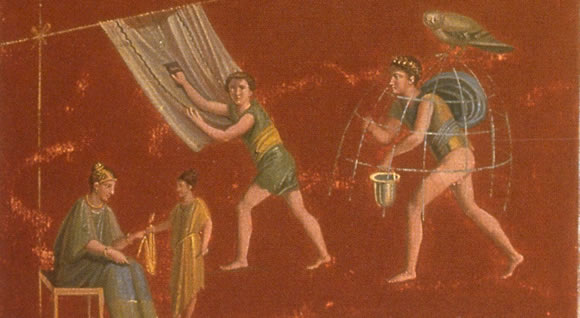Materials:
Masonry pilaster with painted plaster
Dimensions:
174 x 93 x 62 cm
Setting:
Naples, MAN; inv. 9774
Provenance:
Pompeii, Fullonica of Veranio Ipseo (R. VI,8,20)
Date:
Second half of first century AD
The pilaster is decorated on three of its four sides. The scenes depicted on two contiguous sides (the frontal and the right lateral) illustrate in a punctuated manner the various phases of activity of a fullonica, a woolworking shop. Immediately after the weaving, the piece of wool must go through the "fulling" process, in which it is immersed in large basins containing water and soda, and beaten with the feet of the fullers, as shown in the scene. In the upper zone, a young man cards the cloth hung from a beam, using a large metal brush with sharp teeth, while on the right a young man advances, carrying a sort of wicker crate, on which the cloth has been stretched for its sulphur treatment, and the container holding, appropriately, the burning sulphur: above the crate is a little owl, protector of the fullers. Below, on the left, a woman examines a piece of cloth, borne by a maidservant. In the lower register, the fullers wash clothes immersed in basins, beating them with their feet. On the next side, above, is the press, in which cloth, placed on a plank of wood, is "ironed" with the pressure provided by two large screws. In the lower register, two beams are draped with clothes; a young man in a short tunic, a worker, offers a garment to a woman who stands in front of him; they seem to turn to a seated female figure, who holds a small basin (?) in her hands. The painted decoration on the left face is preserved only in the upper zone: inside a sacred building, identified by slender columns which hold up a double-sloped roof, is depicted a nude Venus, represented in a style typical of the Hellenistic period, in the act of leaning with her left arm on a small pilaster, while holding with her right hand, the hem of a cloak which forms a wide curve behind her legs.


